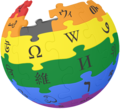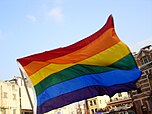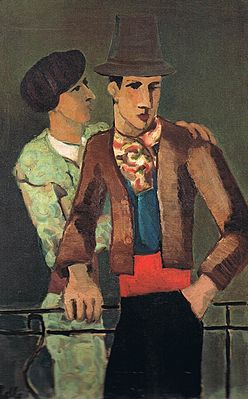Portal:LGBTQ
| Main page | WikiProjects & Things you can do |

|
The LGBTQ+ Portal |

|

|

|
Introduction LGBTQ (also commonly seen as LGBT, LGBT+, LGBTQ+, and LGBTQIA+) is an initialism for lesbian, gay, bisexual, transgender and queer or questioning. It is an umbrella term, broadly referring to all sexualities, romantic orientations, and gender identities which are not heterosexual or cisgender. In the 1990s, gay, lesbian, and bisexual activists adopted the term LGB, supplanting narrower terms such as "gay or lesbian". Terminology eventually shifted to LGBT, as transgender people became more accepted within the movement. Around that time, some activists began to reclaim the term queer, seeing it as a more radical and inclusive umbrella term, though others reject it, due to its history as a pejorative. In recognition of this, the 2010s saw the adoption of LGBTQ, and other more inclusive variants. Some versions of the term, such as LGBT+ and LGBTQ+ add a plus sign, to represent additional identities not captured within the acronym. Many further variants exist which add additional identities, such as LGBTQIA+ (for intersex, asexual, aromantic, and agender) and 2SLGBTQ+ (for two-spirit), LGBTQQ (for queer and questioning), or which order the letters differently, as in GLBT and GLBTQ. The collective of all LGBTQ people is often called the LGBTQ community. These labels are not universally agreed upon by everyone that they are intended to include. For example, some intersex people prefer to be included in this grouping, while others do not. Various alternative umbrella terms exist across various cultures, including queer, same gender loving (SGL), Gender, Sexual and Romantic Minorities (GSRM). (Full article...) Selected article -The Compton's Cafeteria riot occurred in August 1966 in the Tenderloin district of San Francisco. The riot was a response to the violent and constant police harassment of trans people, particularly trans women, and drag queens. The incident was one of the first LGBTQ-related riots in United States history, preceding the more famous 1969 Stonewall riots in New York City. It marked the beginning of transgender activism in San Francisco. The 1960s was a pivotal period for sexual, gender, and ethnic minorities, as social movements championing civil rights and sexual liberation came to fruition. Additionally, the 1950s created the foundation for the trans rights and gay liberation movements with the earlier Homophile movement. Though Stonewall is often heralded as the beginning of the trans rights movement, the importance of Compton's Cafeteria Riots and the homophile movement that came first. Social groups helped mobilize and even churches, like Glide Memorial Methodist Church in San Francisco, began reaching out to the transgender community. Nevertheless, many police officers resisted these movements and the increasing visibility of these groups, continuing to harass and abuse transgender people. This simultaneous rise in support for transgender rights on the one side and the unwillingness to accept these new ideas on the other created the strain that fueled the riot at Compton's Cafeteria in the summer of 1966. The incident began when a transgender woman resisted arrest by throwing coffee at a police officer. It was followed by drag queens and transgender women pouring into the streets, fighting back with their high heels and heavy bags. (Full article...) Selected biography -Quentin Crisp (born Denis Charles Pratt; 25 December 1908 – 21 November 1999) was an English raconteur, whose work in the public eye included a memoir of his life and various media appearances. Before becoming well known, he was an artist's model, hence the title of his most famous work, The Naked Civil Servant. He afterwards became a gay icon due to his flamboyant personality, fashion sense, and wit. His iconic status was occasionally controversial due to his remarks about subjects like the AIDS crisis, inviting censure from gay activists including human-rights campaigner Peter Tatchell. During his teen years, he worked briefly as a rent boy. He then spent thirty years as a professional model for life classes in art colleges. The interviews he gave about his unusual life attracted great curiosity, and he was soon sought after for his personal views on social manners and the cultivation of style. (Full article...) Selected quote -
—Eric Allman (1955–), on Sendmail, his widely used email routing software
Current events
Selected image - Helmut Kolle was a German modernist painter who emigrated to France where he lived together with art collector Wilhelm Uhde for the rest of his life (which was unfortunately cut short by heart disease). Kolle's paintings almost exclusively feature males—at the start of his career rather effeminate-looking boys, sometime later muscular men, particularly sailors, toreros, and soldiers, usually in poses that are rarely overtly homosexual but certainly suggestive, at least to gay viewers. In this painting from about 1927 a torero puts his hand softly on the shoulder of a picador.
Did you know… -
This month's birthdays
Selected listsRelated portalsFeatured contentThe following articles and lists have been identified as some of the best produced by the Wikipedia community:
TopicsCategoriesAssociated WikimediaThe following Wikimedia Foundation sister projects provide more on this subject:
Discover Wikipedia using portals |

























